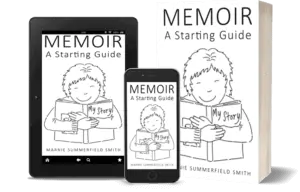
It’s coming to the end of the year, when I start to feel even more reflective than usual. So I thought I’d have a look at my list of current authors and the courses I teach and see what has been learned, or what wisdom has been reinforced, this year. If you’re writing memoir, or considering it, there’s a nugget, or two, for you here I’m sure!
- Keep your material organised, and documents saved with helpful titles and dates. It can be soul destroying to not know which is your most recent edit or worse, to work on The Wrong One.
- Re above: also, save your well-organised materials in several places to avoid loss. Computers can die and even memory sticks can corrupt. I use OneDrive, Microsoft’s cloud service to back everything up.
- If you have written a book, or even a memoir before, don’t approach the current one in the hope it may feel exactly the same. You cannot step into the same river twice. You may have learned a great deal on your previous project but this one is new and may require an entirely new approach and new patience.
- Oldie but goodie: be careful who you show your work to. Other people may have subconscious agendas that neither they nor you are aware of. They may also muddy your memories by claiming that things happened differently to how you remember them.
- Read memoir. How can you expect to give other people an experience that you yourself have not experienced? If you don’t like to read a lot, watch films based on memoir or real-life characters. It’s all inspiring and food for thought.
- The voice is the most important part of any memoir, guiding your audience through the story both as main character and narrator. It can also be the most dificult element to achieve. You’ll know you have it when your memoir feels like you. Keeping on writing is the way to find and strengthen your voice.
- If you’re nervous about releasing your book into the wild, remember that you’re in control of when this happens. It can take some time to absorb that you’ve actually finished writing – especially if the project has been on your mind for years. Finish your book, pause, reflect, and don’t rush into anything.
- Writing memoir can be hard but most people push through in the end. However, if it feels too hard emotionally, perhaps really daunting and frightening, then it may be that you have not processed some extremely difficult emotions or even trauma. Writing can be therapeutic but it’s not therapy. You may need some additional help so that you don’t re-traumatise yourself by reliving the past. Never be afraid to press pause on your project. You can always come back to it.
- Reading your work aloud is a great way to start the editing process. You’ll find the bumps, corners and edges that your readers will stumble over too.
- Writing your memoir is a gift to the world, whoever your intended audience is. This is why I so deeply appreciate and am grateful to all who undertake this couragous task. But never forget that writing a memoir is a gift to you and can enhance your life in unexpected ways too. One of my authors wrote about a man who abused her as a child. He was still alive when she published but as far as she knew, never read the book. She was on solid legal ground because he’d been made to sign the sex offenders’ register. He died recently and my author, who doesn’t have a vindictive bone in her body, went to the funeral and before the grave was filled in, threw her memoir onto her abuser’s coffin. Closure may be a cliché not achievable in real life, but to my author that felt pretty damn close.

